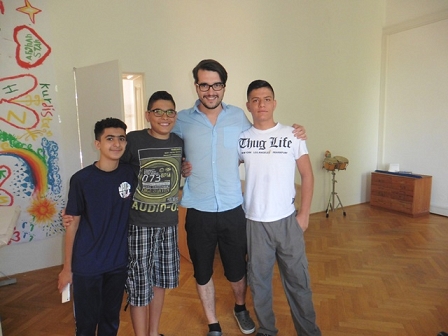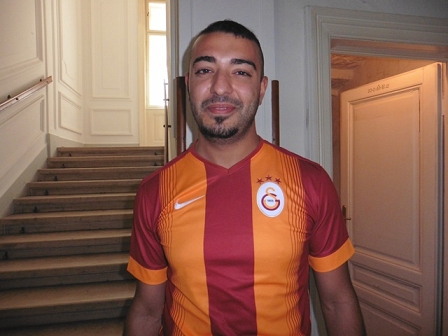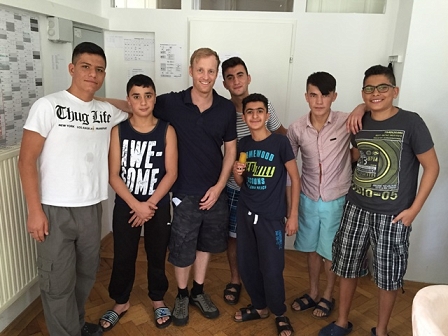Erstellt am: 10. 7. 2015 - 14:40 Uhr
A Fresh Start - An Ersatz Family
Ali, a teenager from Afghanistan sings, acappella, a hauntingly beautiful song, his eyes screwed shut, the melody swirling high and then coming to an abrupt stop. His “brothers” burst out into applause. It is a song about mothers, explains 16-year old Milad.
It’s a poignant choice of song. Ali and Milad and the 6 other boys who call this run-down white-washed house in Vienna’s leafy 19 district home are here without their parents. Forced to flee their homelands of Afghanistan and Syria, they made the long journey overland to the Austria, usually arriving in cramped asylum reception centres.
Milad and his brother Helmand spent seven months on the road: “We walked much of the way and sometime we travelled in a car.” Now, three-quarters of a year after leaving their parents behind, they have been given a home and a sort of replacement family.
The Georg-Danzer-Haus is named after the socially-minded Austropop legend, who liked to remind us that no-one flees their home country without a good cause. It’s a project run by an association called Fluchtweg and is funded by the Jugendamt. Young unaccompanied asylum seekers live together with social workers and try and glue together a new life in a new county through education, communal sport and just the experience of living together – supporting each other and seeing familiar faces when they wake up.

Chris Cummins
It's hard to imagine what it means to have to leave your family and home before your 18th birthday. You have to grow up terrifyingly fast in conflict zones. That’s what happened to Milad and Helmand whose family was threatened because an older brother had worked as a translator for the US.
“It’s really like a family here,” says Helmand, “I haven’t had contact with my family for months but here it feels like I have many brothers. I tell them they are my brothers.”
The refugees act so grown up and seem so mature it is hard to remember these are children – traumatized children who have good days and bad days.
Christoph who works as an educator at the house says the structure helps deal with the inevitable problems, solving differences in the intimate, casual family. “It also helps with the integration in the neighbourhood. Our neighbours see our boys going about their daily lives, buying bread, playing football, going to school. After all the talk of quotas and laws, people see a face. We have had an overwhelming positive response from the neighbourhood. They bring us things we need.”
Another social worker Kemal works very closely with the young refugees. A muscular young man wearing a Galatassaray football short, Kemal’s parents are from Turkey – he says this migrant background helps him fulfil a big brother role in the family: “It helps me understand their system of values. They are the same of mine. It’s great I can play the big brother role and it is great to feel I have gained new family members.”

Chris Cummins
The positive atmosphere at this house is deeply moving. The boys have an obvious for each other and for the social workers. There is a feeling of warmth.
I’m always nervous interviewing minors. It is important to listen to their stories; it’s important to give young people the sense that their voices are being heard. And yet you don’t want to pry; to dig up traumas with journalistic curiosity. Is it really any of my business why they fled?
But the teenagers are open and friendly. I’m struck by the lack of self-pity. The boys I talk to express gratitude at being able to live somewhere "safe" and “quiet” – things we mostly take for granted. They beam with enthusiasm for learning new languages and about new cultures. They listen to each other talk without interrupting. I find it utterly humbling to talk to them. And the irony of their gratitude partly shames me.
“Austria is a helpful country who will help anyone,” says Helmand, beaming a smile. Having seen the shocking pictures from Traiskirchen and having read cold-hearted comments on the internet and even from within the Austrian Parliament building, I briefly have to look at the floor. Europe has a long way to go until it can live up to those words.

Georg Danzer Haus
These are just eight boys. Hundreds more are stuck cramped conditions in asylum receptions centres and the capacity is not yet there to help them:
“We want to expand. We want to open as many houses as possible in the near future,” says Christoph, “It’s unfair – no it is a tragedy – that young people are left sitting in Traiskirchen with nothing to do and no sense of vision for their future. Here at the Georg Danzer Haus we believe that education, a sense of purpose and activity and sustainable integration are vital for our society.”
He says the bureaucratic hurdles that stop more houses being provided should be eased as soon as possible.


